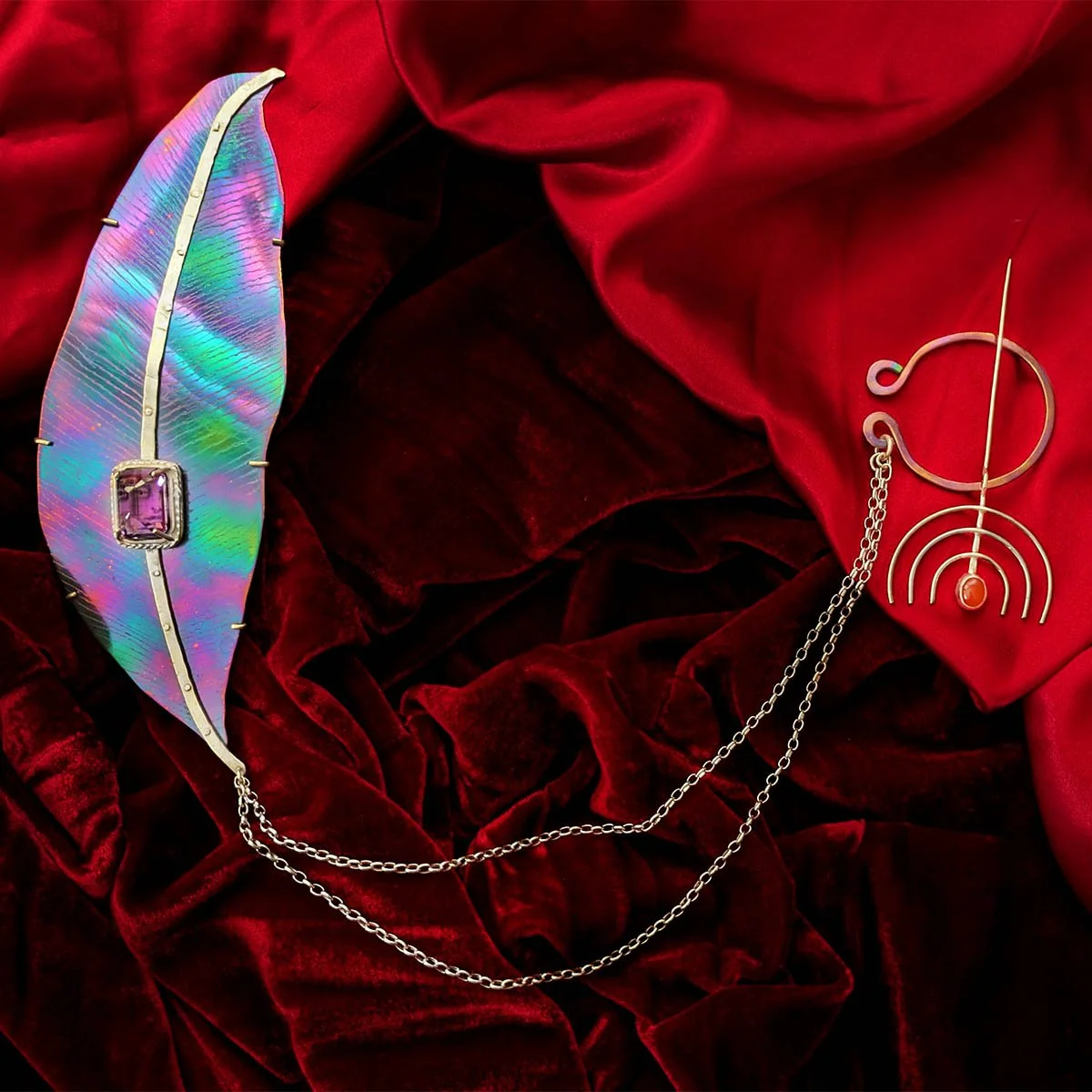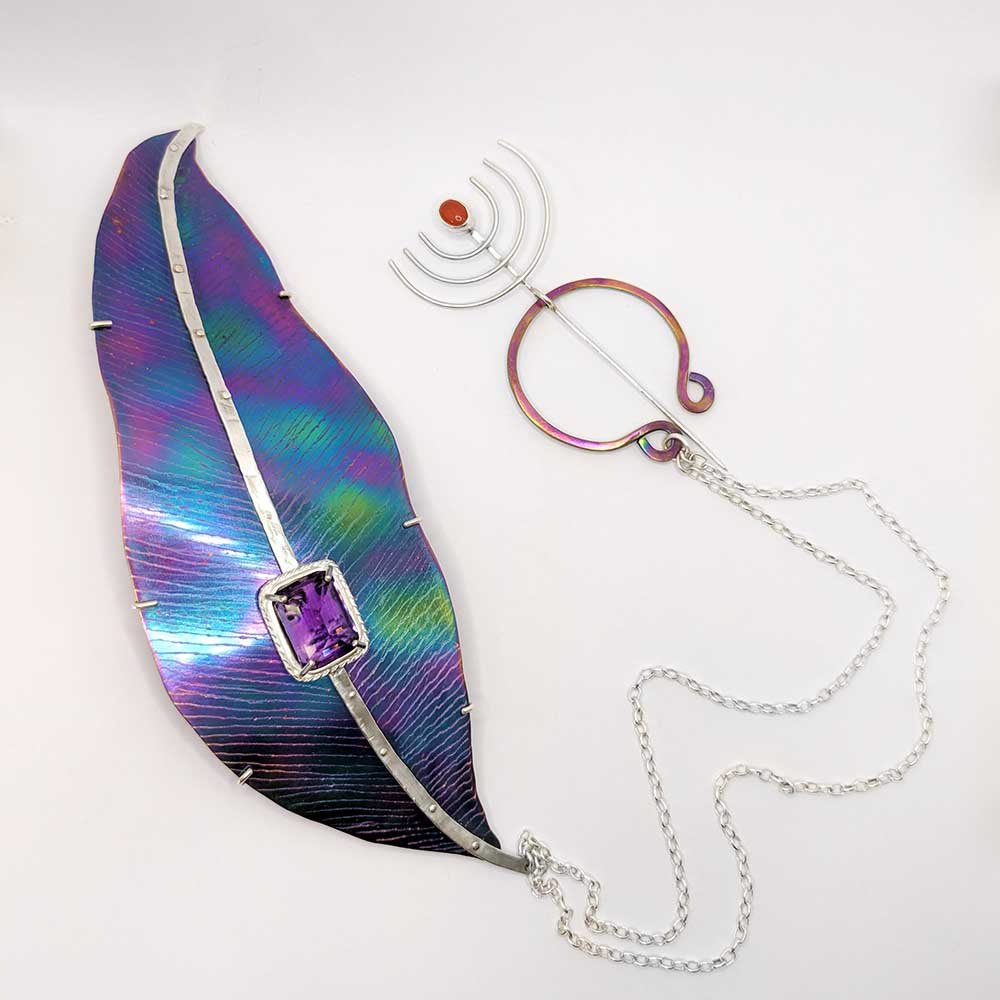 Image 1 of 11
Image 1 of 11

 Image 2 of 11
Image 2 of 11

 Image 3 of 11
Image 3 of 11

 Image 4 of 11
Image 4 of 11

 Image 5 of 11
Image 5 of 11

 Image 6 of 11
Image 6 of 11

 Image 7 of 11
Image 7 of 11

 Image 8 of 11
Image 8 of 11

 Image 9 of 11
Image 9 of 11

 Image 10 of 11
Image 10 of 11

 Image 11 of 11
Image 11 of 11












Karti
Brooch and fibula: responsibly sourced sterling silver, heat coloured titanium, emerald cut 12.78 carat Bolivian amethyst, carnelian cabochon, acrylic paint on linen, varnish, sterling silver chain.
Karti is essentially composed of two pins which are attached through a chain. Its name is a reference to one of the prayers and symbols of the Jewish New Year (Rosh Hashana), which represents divine protection from the malevolent forces that threaten the Jewish people.
Karti was made in the immediate aftermath of the October 7 massacres in Israel, and speaks especially of the strength of Jewish women.
Its design cites the traditional jewellery produced and worn by Jews in North Africa prior to our ethnic cleansing in the middle of the 20th Century. Traditionally, Jewish women would have worn two fibula brooches—one on each shoulder—which fastened garments. A chain traditionally connected between the brooches and suspended beads or other ornaments with various symbolic meanings.
In Karti, the fibula takes the form of an inverted Menorah, an ancient symbol of Jewish continuity, set with a carnelian cabochon, carnelian being a traditional material used throughout the Middle East and North Africa. Meanwhile, the titanium and silver brooch is shaped like an oversized olive leaf, representing the Jewish connection to the land of Israel as well as peace. The Bolivian amethyst on this brooch was set upside down, enabling the pavilion facets to fracture and multiply the miniature portrait (painted by hand using acrylic paint on linen) that is set behind the gem. The portrait allegorically depicts Jewish women, with facial features drawn from multiple images of female members of our family as well as Anne Frank and Golda Meir.
Karti was exhibited as part of the Intimate Worlds exhibition at NorthSite Contemporary Arts in Cairns. Occurring between August and October in 2024, the exhibition “is about celebrating materiality and process. The artists featured in ‘Intimate Worlds’ have a profound respect for their materials, and their work reflects a deep curiosity and dedication to their craft.” The work was similarly exhibited as a response exhibition to the Phantom superhero comic in 2023 in the Bundaberg Regional Art Gallery as part of the Phantom Response exhibition.
Adam also published a magazine article which included text and images of his work, including Karti, in Yad Mizrah Magazine. Click here to view the article.
Approximate dimensions:
Olive leaf brooch: 18cm x 6cm.
Fibula: 8.5cm x 4cm.
Chain length: 22cm.
Brooch and fibula: responsibly sourced sterling silver, heat coloured titanium, emerald cut 12.78 carat Bolivian amethyst, carnelian cabochon, acrylic paint on linen, varnish, sterling silver chain.
Karti is essentially composed of two pins which are attached through a chain. Its name is a reference to one of the prayers and symbols of the Jewish New Year (Rosh Hashana), which represents divine protection from the malevolent forces that threaten the Jewish people.
Karti was made in the immediate aftermath of the October 7 massacres in Israel, and speaks especially of the strength of Jewish women.
Its design cites the traditional jewellery produced and worn by Jews in North Africa prior to our ethnic cleansing in the middle of the 20th Century. Traditionally, Jewish women would have worn two fibula brooches—one on each shoulder—which fastened garments. A chain traditionally connected between the brooches and suspended beads or other ornaments with various symbolic meanings.
In Karti, the fibula takes the form of an inverted Menorah, an ancient symbol of Jewish continuity, set with a carnelian cabochon, carnelian being a traditional material used throughout the Middle East and North Africa. Meanwhile, the titanium and silver brooch is shaped like an oversized olive leaf, representing the Jewish connection to the land of Israel as well as peace. The Bolivian amethyst on this brooch was set upside down, enabling the pavilion facets to fracture and multiply the miniature portrait (painted by hand using acrylic paint on linen) that is set behind the gem. The portrait allegorically depicts Jewish women, with facial features drawn from multiple images of female members of our family as well as Anne Frank and Golda Meir.
Karti was exhibited as part of the Intimate Worlds exhibition at NorthSite Contemporary Arts in Cairns. Occurring between August and October in 2024, the exhibition “is about celebrating materiality and process. The artists featured in ‘Intimate Worlds’ have a profound respect for their materials, and their work reflects a deep curiosity and dedication to their craft.” The work was similarly exhibited as a response exhibition to the Phantom superhero comic in 2023 in the Bundaberg Regional Art Gallery as part of the Phantom Response exhibition.
Adam also published a magazine article which included text and images of his work, including Karti, in Yad Mizrah Magazine. Click here to view the article.
Approximate dimensions:
Olive leaf brooch: 18cm x 6cm.
Fibula: 8.5cm x 4cm.
Chain length: 22cm.































